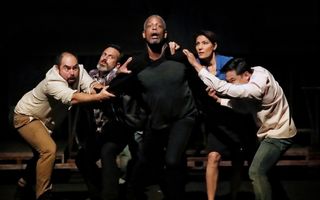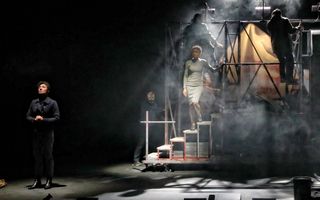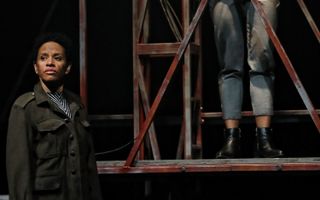 Watch
Watch
Trump and Shakespeare: all the world’s a stage
Op-ed by James Evans in The Sydney Morning Herald, published 21 June 2017.
There's nothing like an anti-Shakespeare protest to remind us that Shakespeare is a radical. Yes, William Shakespeare, the Bard of Avon, bastion of the establishment, whose portrait adorns every page of the new British passports as a watermark, authentic proof of British cultural supremacy. A radical?
This month, the Public Theater of New York opened a production of Shakespeare's Julius Caesar, unambiguously portraying the blustering, narcissistic title character as Donald Trump. Because Caesar is stabbed to death in the play, corporate sponsors withdrew their support, protesters interrupted a performance, and death threats spewed out indiscriminately at theatre companies across the country.
The protests, of course, miss the point, as anyone who took two minutes to google "Julius Caesar plot" would know. Caesar's murder is no cause for celebration in the play. Oscar Eustis, artistic director of the Public Theater, responding to the controversy, said: "Those who attempt to defend democracy by undemocratic means pay a terrible price and destroy the very thing they are fighting to save." No society can thrive when it is founded on an act of murder.
Shakespeare was obsessed with leadership. In play after play he scrutinised failed leaders and challenged beloved ones. This could have been dangerous, and Shakespeare seems to have walked a fine line, politically, thriving at a time when less careful artists were caught up in the machinery of the Elizabethan police state. His plays were set in Ancient Rome, Medieval Britain, and mythical lands, but they always spoke urgently to the present day.
In Julius Caesar, written at the halfway point of Shakespeare's career – he delivers a ruthlessly efficient exploration of leadership, politics and power. The language of the play is direct and explosive: mob violence erupts, relationships fracture, and empires crumble, all through the power of the spoken word.
Brutus justifies the decision to kill his friend by literally commanding himself, out loud, to "prevent" the hypothetical rise of Caesar. He instructs himself to "fashion" the argument against Caesar, "think him as serpent's egg" and, finally, to "kill him in the shell". Brutus shapes his own thoughts with spoken language, which is what Shakespeare asks of us.
Mark Antony's oration at Caesar's funeral: "Friends, Romans, countrymen, lend me your ears", is one of the most remarkable pieces of rhetoric ever written. By turns inspiring, manipulative, intimate and forceful, Antony's words transform the mob from cheering supporters of Brutus and the conspirators, to baying for their blood.
Julius Caesar was probably first performed in 1599, at the new Globe Theatre on the south bank of the Thames. Having just overseen the construction of the building, Shakespeare was in a metatheatrical mood. "All the world's a stage", a common metaphor at the time, was enshrined by Shakespeare in another 1599 play, As You Like It, and will forever be associated with his work.
In Julius Caesar, Shakespeare's conspirators know they are creating history. Immediately after the murder of Caesar, Cassius, one of the chief conspirators, says:
How many ages hence
Shall this our lofty scene be acted over
In states unborn and accents yet unknown?
Cassius imagines himself immortalised as a saviour of Rome, presumably played by Leonardo DiCaprio in the movie. Of course, Shakespeare doesn't allow Cassius to bask in victory. The assassination occurs at the midpoint of the play, and Shakespeare is more interested in the fallout than in the act itself. The pre-emptive strike against Caesar creates a power vacuum that sets the cause of Roman democracy back by more than a thousand years.
Shakespeare seems even to have predicted the fury levelled against his own work. Staff at Shakespeare theatre companies across the US, who had nothing to do with the Public Theater production, reported receiving a slew of death threats, rape threats, and wishes that family members would die. This shocking outburst is captured perfectly in an often-overlooked scene in Julius Caesar.
Immediately after Mark Antony turns the mob against the conspirators, Shakespeare pauses and introduces a new character, an artist – Cinna the Poet. He is surrounded by the mob, who think he is Cinna the conspirator. When they find out he has nothing to do with the conspiracy, they decide to kill him anyway:
Tear him for his bad verses.
When leaders use language that provokes or normalises violence, a dark, collective urge is unleashed. And the artist is always the first target.
In those incoherent death threats in America this week, and in the mob violence in Shakespeare's play, we catch a glimpse of why people are so angry. Art is challenging. It is an affront to the status quo. It asks us to think critically about the structures within which we live, and imagine how they might be different. Good art, no matter how old, is unrelentingly radical.





